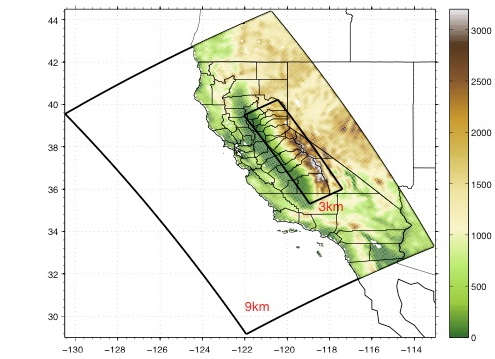
|
||||||||||||||||
|

Research
Overview The
overarching goal of our research is to narrow uncertainties
surrounding climate variability and change. We do this by
focusing on the three areas described below. 
Climate feedbacks: Certain processes within the climate system can interact with one another to either exacerbate or mitigate the planet's response to an increase in greenhouse gas concentrations. These interactions are called climate feedbacks, and uncertainty surrounding them is a major reason why current global climate models give such a large range of responses in future climate change experiments. A distinct theme of our work in this area is the use of current observations to constrain models' climate feedbacks. Regional climate dynamics: Because global climate models are relatively coarse in resolution, they provide little information about climate and climate change at scales most relevant to people and ecosystems. The goal of this work is to understand the forces shaping climate at the regional scale. We rely on observations and newly-emerging, high-resolution regional earth system models, which we are active in developing. Interdisciplinary research: Investigating how climate change will affect human and natural systems requires the expertise of researchers in other physical and social science disciplines. We are increasingly involved in collaborations across disciplines, applying climate science in areas such as fire, ecology, water resources, and renewable energy. Recent Projects Climate Change in the Los Angeles
Region. In this project, we developed a novel method
to downscale information from global climate models and produce
high-resolution climate change projections for the Los Angeles
region. Using a hybrid of dynamical and statistical techniques,
we downscaled more than 30 global climate models to 2-km
resolution and projected changes in temperature, precipitation,
other aspects of climate at the middle and end of the 21st
century. Our results are published in a special issue of Journal
of Climate, highlighted on KCET's Climate
Change LA site, and summarized at the page linked
below. Southern California Fires Interdisciplinary Project. A large interdisciplinary collaboration between UC Irvine, UCLA, and Jet Propulsion Laboratory, this project's aim was to better quantify and understand how the interactions between climate change, ecosystems, and human population change the fire regime in southern California and subsequent impacts on air quality. Results from this project include a better understanding of what controls wildfires in Southern California and the identification of two distinct regimes of wildfire in this region and how climate change will affect them. Ongoing Projects Climate Change in the Sierra Nevada. Our current focus in regional climate dynamics is a comprehensive study of climate change in California, with an emphasis on the Sierra Nevada Mountains. Using techniques we developed in the Climate Change in the Los Angeles Region project (see above), we are producing regional climate projections for the end of the 21st century at 3-km resolution over the Sierra Nevada and 9-km resolution over the state. We will analyze changes in temperature, precipitation, snowfall, snow melt, and other variables relevant to water resources in the state. 
Identifying Robust Cloud Feedbacks in Observations and Models. In collaboration with Lawrence Livermore National Laboratory, we are producing basic scientific research related to understanding cloud feedbacks to climate change. Learn about our most recent findings from this project. Collaborative Research: Do Microenvironments Govern Macroecology? An interdisciplinary collaboration between UC Berkeley, UCLA, UC Riverside, UC Santa Barbara, Arizona State University, and the US Geological Survey, this project engages a team of climate scientists, ecologists, hydrologists, and biogeographers to investigate how climate and plant-growing conditions vary locally in mountainous areas of the western U.S., and how that local climate variation affects the vulnerability of tree species to regional climate change. Our team contributes to the physical modeling aspect of the project. Our research is supported by the National Science Foundation, the Department of Energy, NASA, the Southwest Climate Science Center, the City of Los Angeles, and the Annenberg Foundation. |
|||||||||||||||




